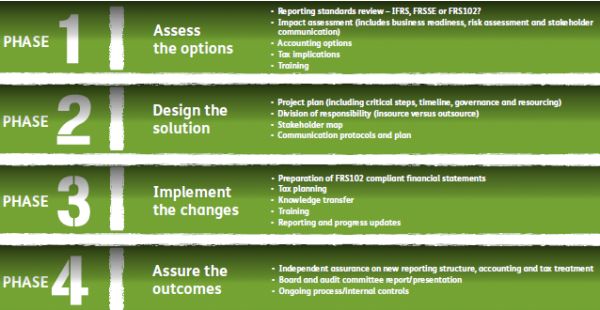FRS102 represents one of the biggest changes to UK financial reporting in recent years, and will result in many changes to existing accounting treatment and practice. Some of these changes will impact tax, and understanding these changes sooner rather than later will help you to plan for the changes, and where possible implement planning strategies to take advantage of them.
What are the key impacts on tax?
Overall the key is to understand the tax impact and decide whether early adoption of FRS102 or planning ahead for when adoption is compulsory is most appropriate. The key issues to consider are:
- managing cash flows - volatility in corporation tax payments; and
- the creation of dividend blocks – the impact of FRS102 to distributable reserves could require restructuring to enable dividend payments.
Which areas could be affected with regard to tax?
FRS102 could impact the tax in the following areas:
Financial instruments
FRS102 will introduce more instances of 'fair value' accounting for financial instruments (as is the case under IFRS), which will result in more movement through the company's profit and loss account. While the starting point for tax calculations is the accounting treatment, there are special rules for the corporation tax treatment of financial instruments. These rules are currently being reviewed with a view to updating them for the introduction of FRS102.
Intangible assets and goodwill
In contrast with UK GAAP, where it is permissible to treat intangibles as having an indefinite useful economic life (UEL), under FRS102 all intangible assets are assumed to have a finite life, and if it is not possible to estimate the useful economic life then the presumption is that the UEL is a maximum of five years. If a company has not made an election to claim the 4% writing down allowance under the intangible asset regime for a qualifying asset, then there could be an increased tax deduction if amortisation rates increase.
Distributable reserves
Various adjustments under FRS102 will impact distributable reserves, for example deferred tax will need to be provided on a greater range of assets (e.g. investment properties, even when there is no intention to sell) under FRS102. This could have implications for distribution policies and balance sheet presentation. However it may be possible to limit the impact of this change through appropriate planning.
Do I need to make quarterly instalment payments?
The changes to the accounting treatment required under FRS102 may result in changes to the accounting profit, which in turn could result in a requirement to make payments of corporation tax via quarterly instalments.
Accounting for operating leases
Lease incentives are to be spread over the entire lease term, rather than the period to the earliest break/rent review as is currently the case under UK GAAP. This could result in a deferral of income and therefore tax.
R&D claims and software development
Some assets, such as website and software development costs, could be reclassified as intangible fixed assets under FRS102. This change could provide companies with an opportunity to make additional claims for R&D tax relief (or credits) under the R&D tax credit regime.
How we can help
Smith & Williamson has developed a modular approach that gives you the right kind of support, dependant on your individual requirements and budget.

Where have we done it before?
We have been helping organisations manage changes to their financial statements for many years. This experience means we understand what is required to get the job done, with minimal disruption to your finance team.
We have a dedicated team of technical experts providing advice to a wide range of businesses and contributing to various working parties on the application of FRS102. We are working with a number of clients who are adopting FRS102 early, helping them address the challenges that the new standard brings.
The content of this article is intended to provide a general guide to the subject matter. Specialist advice should be sought about your specific circumstances.




